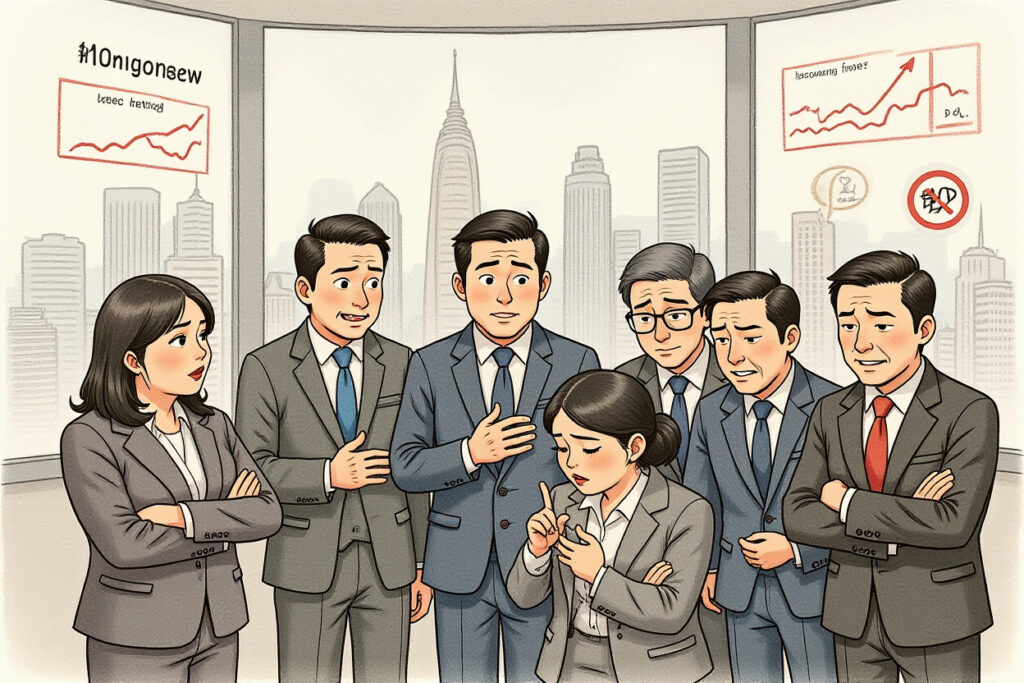Unprecedented Biotech Valuation Surge Rocks Hong Kong Markets
Hong Kong’s biotechnology sector witnessed one of its most dramatic trading sessions in recent memory as Yidian Kang Health (药捷安康, 02617.HK) saw its market capitalization briefly surpass HK$240 billion ($30.7 billion) during September 16th’s trading session. The clinical-stage pharmaceutical company, which just listed on June 23rd at HK$13.15 per share, has achieved a staggering 50-fold increase from its IPO price in under three months, with nearly 600% gains concentrated in the past five trading days alone.
This extraordinary market activity represents both the immense promise and substantial risks inherent in China’s burgeoning biotechnology sector. For global investors tracking Chinese equity markets, Yidian Kang Health’s volatility offers critical insights into market dynamics, regulatory frameworks, and investment patterns shaping one of the world’s most rapidly evolving healthcare markets.
Market Context and Trading Patterns
The biotech sector has emerged as a focal point for investor enthusiasm in Chinese markets, particularly through Hong Kong’s listing platform that has become a gateway for international capital seeking exposure to China’s healthcare innovation. Yidian Kang Health’s dramatic price movement occurred within this context of heightened sector interest, though the scale and velocity of its appreciation stand out even within this optimistic environment.
Trading data reveals sophisticated market participation patterns, with Southbound capital flows through the Stock Connect program playing a significant role. On September 15th, Southbound investors purchased 888,000 shares, bringing their total holdings to 3.06 million shares representing 1.0% of outstanding stock. The following morning saw an additional HK$143 million in net purchases, totaling over HK$300 million across two sessions.
The Clinical Catalyst: Tinengotinib Breast Cancer Approval
The immediate trigger for the buying frenzy emerged from regulatory developments surrounding Yidian Kang Health’s lead drug candidate. On September 10th, the company announced that its core product Tinengotinib (TT-00420) received implied approval for Phase II clinical trials in breast cancer from Chinese regulatory authorities.
According to the company’s prospectus, Tinengotinib represents a novel multi-target kinase (MTK) inhibitor targeting three critical pathways: FGFR/VEGFR, JAK, and Aurora kinases. This mechanism shows potential for addressing multiple drug-resistant, recurrent, or refractory solid tumors including cholangiocarcinoma, prostate cancer, liver cancer, breast cancer, biliary tract cancer, and pan-FGFR solid tumors.
Development Status and Global Trials
As of June 30th, Tinengotinib was involved in nine company-sponsored clinical trials either completed or ongoing worldwide. These include two trials focusing on healthy subjects and seven targeting patients with solid tumors. The drug’s development pipeline represents significant potential value, though it remains at relatively early stages compared to commercially available treatments from established pharmaceutical companies.
The concentration of value in a single developmental asset highlights both the opportunity and risk profile that characterizes early-stage biotech investing. For Yidian Kang Health, nearly the entire company valuation rests upon successful development and commercialization of this compound, creating exceptional volatility around clinical development milestones.
Corporate Disclosure and Market Response
In a remarkable contrast to the market enthusiasm, Yidian Kang Health issued a formal disclosure to the Hong Kong Exchange stating: “The Board confirms that it is not aware of any reasons for such price and trading volume movements or any information that must be announced to avoid a false market in the company’s securities or any inside information that must be disclosed under the Listing Rules.”
The company further confirmed that business operations remained normal without material changes to financial position or operational performance. This disclosure created a striking juxtaposition between market behavior and fundamental business developments, raising questions about whether market participants were responding to information beyond what the company itself recognized as material.
Regulatory Framework and Disclosure Requirements
Hong Kong’s listing rules require timely disclosure of material information that could affect security prices or investment decisions. The exchange’s Guidance Letter GL86-16 specifically addresses disclosure of inside information, emphasizing that companies must keep investors informed of potentially price-sensitive developments. Yidian Kang Health’s statement suggests that, from a corporate perspective, no such developments had occurred warranting disclosure beyond the September 10th clinical trial announcement.
This regulatory context matters significantly for international investors assessing Chinese companies listed in Hong Kong. The disclosure standards and enforcement mechanisms provide important protections, but also create interpretation challenges when market movements appear disconnected from official corporate communications.
Cornerstone Investors and Lock-Up Considerations
The dramatic price appreciation created extraordinary paper gains for early investors, particularly cornerstone investors who participated in the June IPO. According to offering documents, Yidian Kang Health attracted several strategic cornerstone investors including Jiangbei Pharmaceutical, Akeso Biopharma (康方生物, 09926.HK), HuaSheng DunXing, Pharmablock (药石科技, 300725.SZ) through its wholly-owned subsidiary Pharmablock Horizon, and Kelan An.
These investors collectively subscribed to approximately HK$1.3 billion worth of shares, representing 64% of the global offering. Akeso Biopharma and Pharmablock each invested HK$100 million, receiving approximately 760,500 shares at the HK$13.15 offering price.
Pharmablock’s Substantial Exposure
Beyond its cornerstone investment, Pharmablock held additional shares through earlier investment rounds. Post-IPO, the company held 22.93 million shares representing 5.78% of outstanding stock. At the September 16th intraday high of HK$679.50, this position reached approximately HK$15.6 billion in value—exceeding Pharmablock’s own market capitalization on China’s A-share market.
When contacted by journalists, Pharmablock’s investor relations department characterized the relationship as financial in nature while acknowledging ongoing business collaboration in drug development. The company noted that its investment is classified under accounting standards as “financial assets at fair value through other comprehensive income” reported under “other equity instrument investments,” meaning valuation changes affect comprehensive income rather than net profit.
Lock-Up Expiration Timeline
Critical for market structure analysis, all cornerstone investors agreed to a six-month lock-up period following the June 23rd listing date. This restriction prevents selling until December 23, 2025, creating a potential overhang of shares that could reach the market once restrictions lift. The enormous paper gains create significant incentive for profit-taking once lock-ups expire, particularly for financial investors without strategic alignment beyond capital appreciation.
For Akeso Biopharma, which did not respond to requests for comment, the investment represents both financial opportunity and potential strategic collaboration in the biopharmaceutical ecosystem. However, the magnitude of gains may create pressure to monetize regardless of strategic considerations given the disparity between current market prices and fundamental business prospects.
Financial Fundamentals and Commercial Reality
Beneath the market excitement lies a commercial reality that warrants careful consideration. Yidian Kang Health has not generated any revenue from product sales, as none of its drug candidates have reached commercialization. Financial statements for the first half of 2025 show a net loss of RMB123 million, improving from a RMB160 million loss during the same period last year.
The company reported RMB98.43 million in research and development expenses and RMB27.47 million in administrative expenses. Cash and cash equivalents stood at RMB449 million as of June 30th, with total equity of RMB582 million. These figures highlight the substantial resources required to advance drug candidates through clinical development while maintaining operations.
Valuation Metrics and Comparative Analysis
At its peak valuation, Yidian Kang Health briefly approached the market capitalization of BeiGene (百济神州), considered the leading innovative drug company in Hong Kong’s market. This comparison becomes particularly striking when considering commercial maturity: BeiGene has multiple approved drugs generating substantial revenue, while Yidian Kang Health remains pre-revenue with candidates in early to mid-stage development.
The company also surpassed more established players like Sino Biopharmaceutical (中国生物制药, 01177.HK) and Innovent Biologics (信达生物) in market capitalization during the rally, despite their proven commercial capabilities and revenue generation. This valuation disconnect suggests market dynamics extending beyond conventional fundamental analysis.
Market Mechanics and Trading Dynamics
The extreme volatility exhibited by Yidian Kang Health shares reflects complex interactions between various market participants. Southbound investors accessing Hong Kong markets through Connect programs contributed significantly to buying pressure, while speculative traders amplified movements through momentum strategies.
Market structure factors also played a role, with relatively limited float following the recent IPO and cornerstone lock-ups creating scarcity dynamics. When combined with positive clinical development news, these conditions created an environment conducive to rapid price appreciation, though the magnitude exceeded reasonable expectations based on fundamental developments alone.
Intraday Volatility and Price Correction
Following the morning surge on September 16th, the stock experienced substantial afternoon selling pressure that erased over HK$100 billion in market capitalization from intraday highs. This pattern suggests profit-taking by short-term traders and potentially some long-term investors despite lock-up restrictions, though the latter would require regulatory exceptions.
The rapid reversal highlights the inherent instability of valuations built primarily on speculative enthusiasm rather than fundamental business progress. For investors considering entry at elevated levels, this volatility represents substantial risk beyond the already significant uncertainties of drug development.
Investment Implications and Risk Assessment
The Yidian Kang Health situation offers several important lessons for investors in Chinese biotechnology equities. First, clinical-stage companies can experience extreme valuation movements around development milestones, creating both opportunity and risk. Second, market dynamics can diverge significantly from fundamental business progress, particularly in sectors with high information asymmetry and complex technology assessment.
Third, investor structures including cornerstone arrangements and lock-up provisions create predictable supply dynamics that can influence prices around expiration dates. Finally, regulatory frameworks provide important disclosure requirements, but market participants may react to information or expectations beyond what companies formally disclose.
Strategic Considerations for Institutional Investors
For sophisticated investors allocating capital to Chinese biotech, several strategic approaches merit consideration:
– Diversification across multiple companies and development stages to mitigate single-asset risk
– Careful assessment of scientific validity and development pathways beyond market enthusiasm
– Understanding of regulatory frameworks and approval processes in both Chinese and international markets
– Monitoring of insider and cornerstone investor behavior around lock-up expirations
– Consideration of hedging strategies to manage volatility around clinical milestones
Forward Outlook and Market Development
The Chinese biotechnology sector continues to represent one of the most dynamic investment opportunities globally, driven by scientific innovation, regulatory reform, and substantial healthcare demand. Companies like Yidian Kang Health demonstrate the potential for significant value creation when development programs succeed, while also highlighting the volatility inherent in the sector.
Looking forward, investors should monitor several key developments: progression of Tinengotinib through clinical trials, additional regulatory milestones, financial position and funding requirements, and market activity around the December lock-up expiration. These factors will likely drive both fundamental business progress and market valuation in coming quarters.
For the broader sector, Yidian Kang Health’s experience may influence investor appetite for early-stage biotech offerings and market behavior around clinical developments. Regulators may also enhance scrutiny of trading patterns and disclosure practices following such extreme volatility events.
Ultimately, successful investment in Chinese biotechnology requires balancing recognition of genuine innovation with disciplined assessment of valuation and risk. The sector offers substantial opportunity, but demands sophisticated analysis beyond momentum chasing or simplistic storytelling. As Yidian Kang Health’s experience demonstrates, markets can sometimes lose connection with fundamental reality, creating both danger and opportunity for informed investors.




